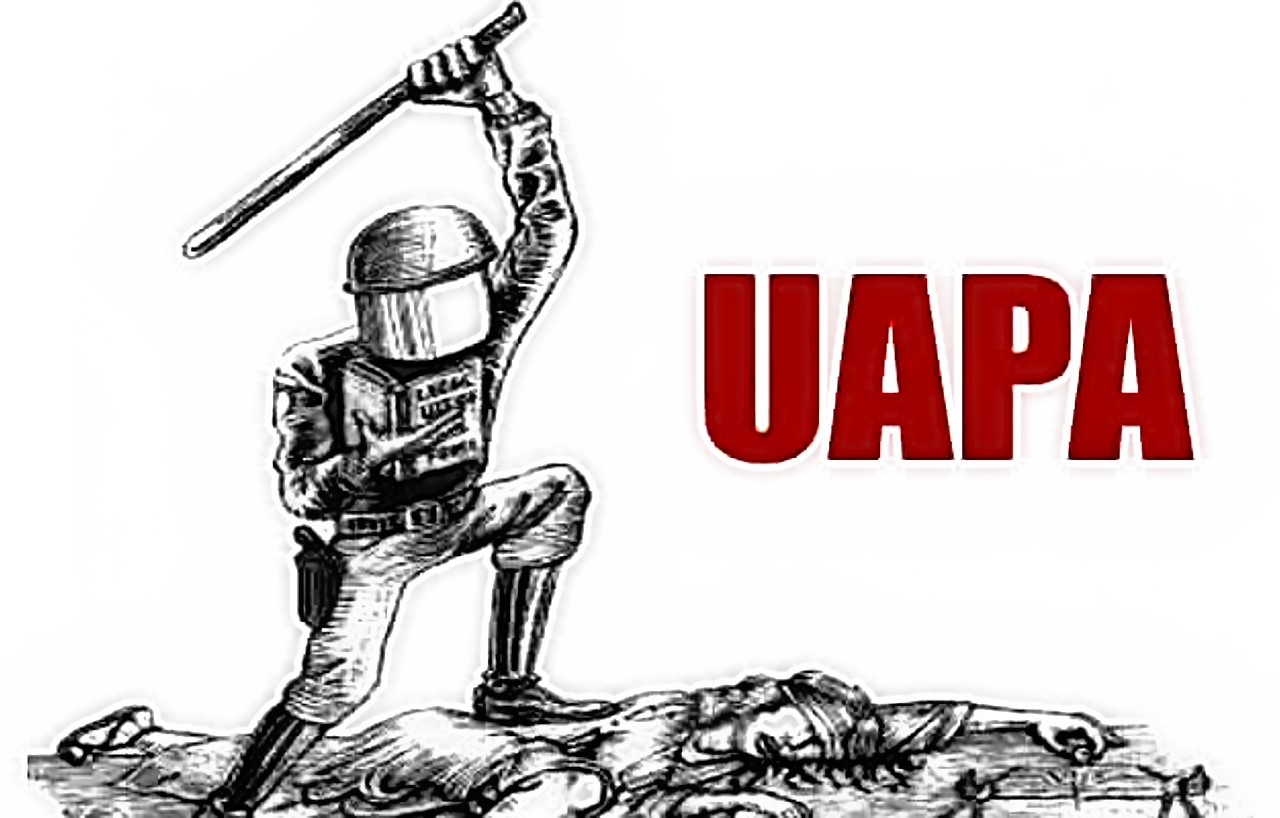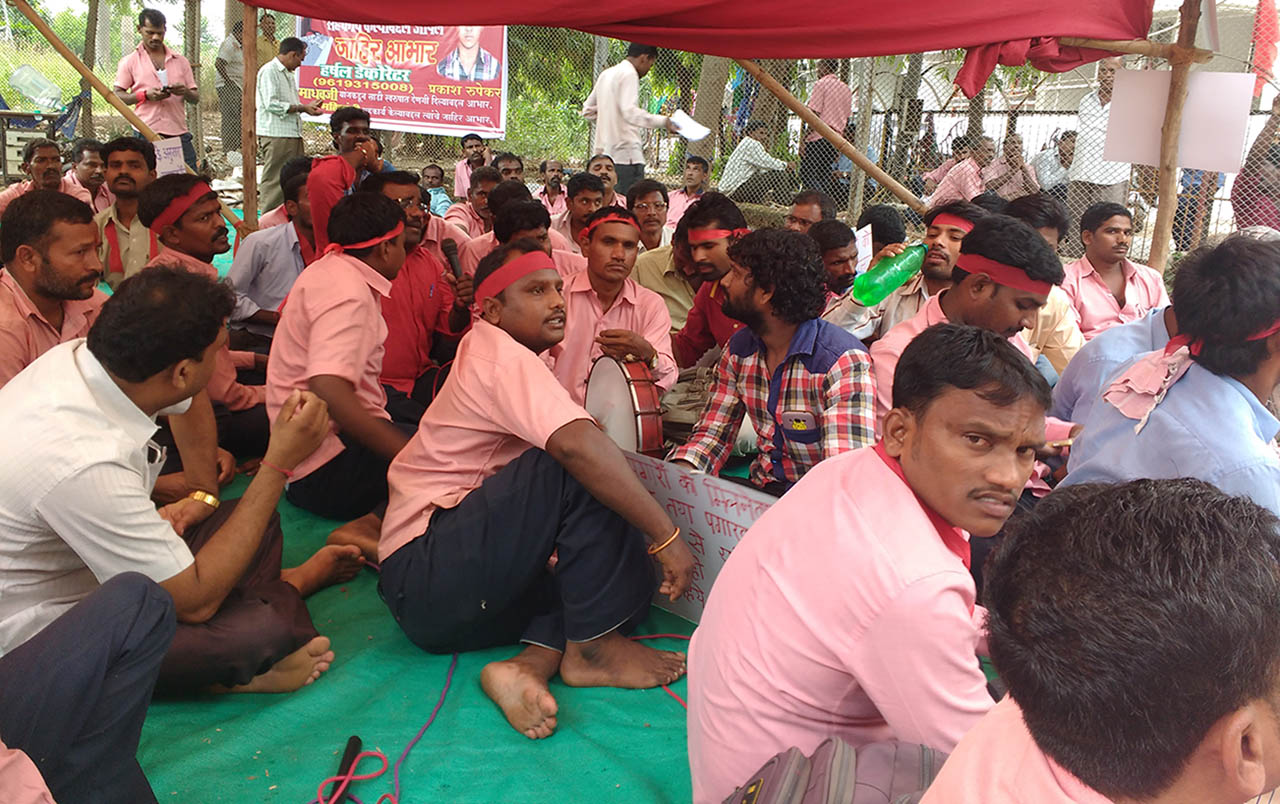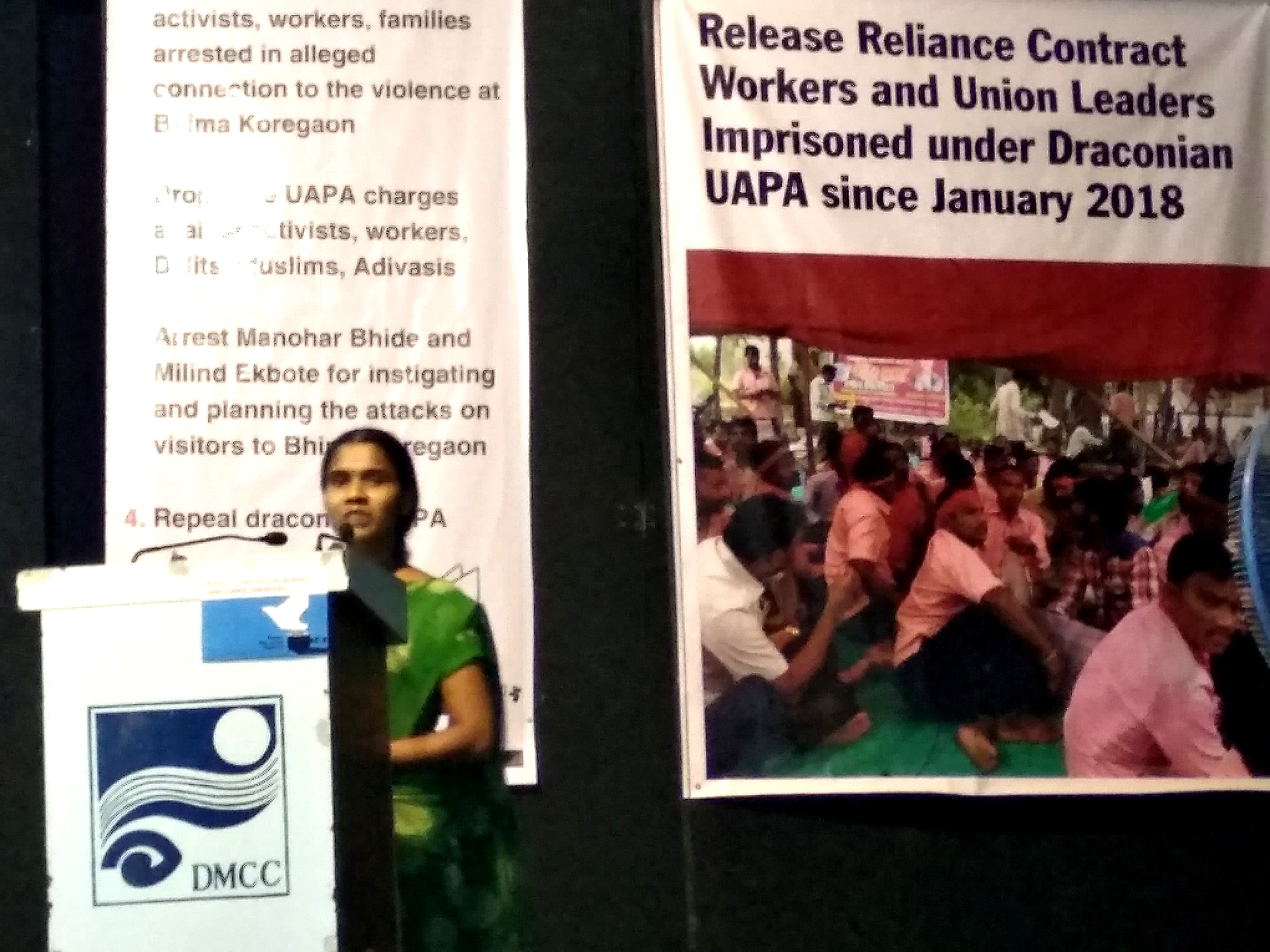A wave of repression has been unleashed on trade union movement through the use of laws like UAPA. In December 2017, Mazdoor Sangathan Samiti (MSS), a registered trade union, which has been working among thousands of tribal workers in Jharkhand, was banned without any satisfactory inquiry. MSS leaders Bachcha Singh, Deepak Kumar and activist Damodar Turi were arrested. On 12th January, a couple of weeks after the Bhima Koregaon Elgar Parishad, several contract workers with the Mumbai Electric Employee Union under Reliance Energy/Infrastructure were arrested by Maharashtra ATS, and charged with UAPA. A GroundXero report on the use of laws like UAPA against electricity workers’ struggle in Mumbai. Click here for an account of the arrests as recounted by one of the Reliance Energy employees himself.
On the night of January 12, 2018, five contract workers of Reliance Energy/Infrastructure Limited, and one labour contractor, were arrested by the Anti-Terrorist Squad (ATS), and charged under UAPA. The day before, another worker activist had been arrested. One more worker was arrested later on January 25. Since then, 5 of the workers – Babushankar Vonguri, Satyanarayana Karrela, Shankar Gunde, Saidulu Singapanga, Ravi Marampally – are still in jail. Their bail application is pending before the High Court. All the five workers were co-founders and committee members of the Mumbai Electric Employees Union, that has been leading the struggle for workers’ rights among employees of Reliance Energy for years. All the arrested are originally from the Telangana/Andhra region, and are part of the migrant Telugu-speaking community in Mumbai. In fact, their Telugu identity is often used by the police to justify branding them as “Naxalites”.
On October 10, the Trade Union Solidarity Committee (TUSC) organised a discussion on “Repression through Use of Law”. While the recent use of UAPA on lawyers and other civil society activists and writers has alerted many to the growing Emergency like situation in the country, this phase of mass UAPA arrests began with the workers trying to organise themselves. Some of the first people to have been arrested under UAPA, post Bhima Koregaon Elgaar Parishad, were workers from the Mumbai Electric Employees Union. The discussion, also attended by family members of the arrested workers, focused on how working people have always been, and continue to be, one of the prime targets of such laws.
The meeting was addressed by Advocate Arif Siddiqui, lawyer of arrested Mumbai Electric Employees Union, M.M. Abhyankar, Treasurer of MEEU, Advocate Suresh Rajeshwar (Indian Association of People’s Lawyers and Committee for Protection of Democratic Rights), and Advocate Susan Abraham, whose own house was raided by the Pune police in the recent past.
The Law
UAPA is an example of what is termed as“preventive detention” acts. It had its predecessors in other similar acts such as TADA (Terrorist and Disruptive Activities) and POTA (Prevention of Terrorist Activities). These acts were enacted supposedly to bring “organised criminal gangs” to justice. In practice however, a huge number of marginalized people, especially those belonging to the Muslim community, were arrested under TADA, and subsequently under POTA, and put in prisons for decades. During the Bombay textile mill strikes of the 80’s, many workers would be kept under preventive detention for years.
In 2004, the same year then UPA Government repealed POTA under widespread protests, a large number of provisions from POTA were written into the UAPA through an amendment, changing the definition of “unlawful activity”, included the definitions of “terrorist act”, “terrorist organisation” from the repealed POTA. Chapters after chapters were copied from the POTA, and pasted into the 1967 UAPA. Moreover, a sunset clause that was earlier part of TADA and POTA – that when there is a drop in the perceived threat, there would be no more need for the legislation to exist – was done away with in the new UAPA.
Conviction rates are extremely low under UAPA. The basic purpose behind usage of UAPA seems to be to catch the leaders of various movements, and put them behind bars for a few years without bothering to prove any of the charges, and use that period to destroy the democratic struggles.
UAPA was again amended by the same government in 2008 after the Mumbai attacks, whereby more POTA and TADA-like provisions regarding maximum period in police custody, incarceration without charge-sheet and restrictions on bail were incorporated into it. Under CRPC, police is supposed to file a charge-sheet within a maximum of 90 days, failing which the accused should be given bail. But now under acts like the new UAPA, that limit has been extended to 180 days.
Most recently, the 2012 amendments to the Act further expanded the already vague definition of “terrorist act” to include any activity that “threaten the country’s economic security”. “Any activity” could literally mean any activity, including workers going on strikes. The Parliament passed this bill that was in contravention with the UN Charter for Human Rights, without almost any discussion. The principle of natural justice was turned on it’s head. Now the police do not have to prove its charges. It is the onus of the accused to prove that they are not guilty as charged.
“Conviction rates are extremely low under UAPA. The basic purpose behind usage of UAPA seems to be to catch the leaders of various movements, and put them behind bars for a few years without bothering to prove any of the charges, and use that period to destroy the democratic struggles. After Bhima Koregaon, 3 lawyers have been charged under UAPA – Arun Ferreira, Surendra Gadling, Sudha Bharadwaj. These were all lawyers who were fighting for the legal rights of the oppressed. Arun Ferreira in fact was the lawyer for Reliance workers in their struggle for workers’ rights”, said Advocate Suresh in the TUSC meeting, as he narrated the history of these draconian laws. “We need to come together and strengthen the campaign against UAPA and such laws,” he added.
Adv. Arif Siddiqi said, “The case of Reliance workers is the first of the UAPA arrests related to Bhima Koregaon. Initially 7 arrests were made, and later one more. During remand, police said they have used Rs. 1,50,000 to support Maoists. Police said that they used cheques. We argued that if it is a cheque payment what is the need for remand, since this is a bank transaction, and can be verified from the bank. But still custody was given to the police”.
According to the lawyer, 93-94% of the UAPA cases that do get resolved, end with acquittal. But these cases take several years to get disposed, and the accused have to remain imprisoned for years till they are granted bail, or till they are acquitted. He talked about the families of such people suffering and getting destroyed in the process, since often the person jailed would be the only bread earner for the family. In the case of arrested Reliance workers, it was alleged in the meeting that the family members are being prevented from meeting with the imprisoned. Lawyers present at the meeting also alleged that the workers are not being given proper amenities inside the jail that they are entitled to as under-trial prisoners. “Prison guards are the only people from the prison establishment who have been sympathetic to the jailed workers so far,” said Advocate Susan Abraham, who has been fighting cases for the falsely accused in post-Bhima Koregaon clashes.
The Workers
All five arrested workers were co-founders and committee members of the Mumbai Electric Employees Union that has been leading the struggle for workers’ rights among the employees of Reliance Energy for years. Treasurer of MEEU, MM Abhyankar talked about the first time Shankar Gunde, along with 6 other workers, were arrested for striking, in 2007, under the ESMA Act on charges of disrupting “essential services” (electricity distribution, in this case). The allegation was that they stopped the vehicles of the Reliance electricity company, amounting to disrupting essential services. According to some sources, this was possibly the first time that ESMA was applied on trade union members in Mumbai. Without any inquiry, all 7 were removed from their jobs.
Eventually, the Government itself told the court they did not have any evidence in support of the charges that were filed. The case was scrapped and the workers were acquitted. However, they are yet to be still reinstated in their jobs. The workers, under a false case, faced arrests and termination of contracts. But ironically, the Reliance Company Manager who had filed such a false complaint did not have to face any kind of punishment.
This is the second time the police have targeted Shankar, invoking UAPA. The chargesheet filed by the police in this case runs into more than 5000 pages. In summary, the main charges are membership of Maoist organisations, influencing trade union movement with radical political ideology, arranging for medical treatment of members from Maoist organisations at Mumbai, and extortion of money from the contractor using Maoist affiliations. Apart from the “prime accused” who has been projected as the key person in this, the rest of the workers have been mainly accused of working with the prime accused, who, it has been alleged, has concealed his “true identity.”
The accused, the union, and their lawyers have outrightly rejected all the allegations, and said that the police have no credible evidence to back up the charges. Several activists and lawyers have also pointed out various contradictions in the chargesheet itself. Regarding the charge of extorting money from the contractor, the Union has categorically rejected the allegation, claiming that the police has used some unrelated bank transaction to frame false charges of extortion. Union leaders and labour rights activists have claimed the arrest of these five workers to be politically motivated.
It becomes clear from the chargesheet that the arrest of the Reliance workers actually had nothing to do with the Bhima Koregaon Elgar Parishad, as opposed to what the police and media accounts wanted people to believe then. In the chargesheet, the police in fact connected the 12th January arrests to the history of labour agitations led by MEEU for workers’ rights and dignity. One such incident was a 4-5 hours of strike on December 19, 2017.
A contract worker, Durgaiah, fell from a bridge while on his way back from work, and sustained injury on head. He was taken to a local hospital which did not have the proper facilities. ESI card was needed to be able to shift to Sion hospital. As the worker kept fighting with death in the hospital bed, the Reliance management refused to come to the hospital with the ESI papers that were required for any kind of medical attention. After keeping the rest of the workers at the hospital waiting for hours, they finally declared that Reliance did not have any responsibility in the matter, since the accident happened outside the factory premises. This is after they have been cutting regular ESI fees from the workers’ wages.
Durgaiah died on 18th December. Workers struck work in protest the next morning. Under pressure, the Director agreed to finally issue ESI cards to the workers. After this announcement, the strike was lifted, and workers went back to work. The strike had lasted for only a few hours. Cases were filed on 4 workers for organising the strike. Four months after the strike, the management filed a rejoinder to the old complaint saying that the workers, during the strike, had also threatened that they are connected with the Maoist party. Somehow an allegation this serious, was not there in the original complaint.
After the UAPA arrests, the contractor in question claimed that the accused this time, were the same workers who had provoked the strike following Durgaiah’s death. However, except for one person among the 6 workers arrested under UAPA, no one was mentioned in the 2017 chargesheet following the strike. “They know they cannot prove any of the charges they have brought, but their main aim is to lock up the leaders of the workers’ struggle for several years, in order to demolish the struggle. That is why they used UAPA, because all they really want is preventive detention, so that their profit making can continue at the cost of workers’ lives and dignity,” said one of the activists present at the meeting.
The Company Owners
Anil Ambani’s Reliance Energy/Infrastructure, which recently sold its Bombay Suburban Electric Supply to Adani Transmission, has conveniently washed its hands off the matter claiming that the workers are employed by the contractor, and not them. In the ESMA and other cases however, Reliance management has been the one directly filing cases against the workers, and not the contractors.
Reliance Infrastructure has had a horrific track record when it comes to workers’ rights. There have been regular deaths and innumerable cases of injuries to workers from sustaining electric shocks, burns and injuries, because of unprotected, substandard working conditions. “Before we began unionising, daily wage of the Reliance worker was Rs 30. But the workers had to sign a receipt that said Rs. 60. The margin would have to be paid to the contractor, to the then union, etc. It took a lot of struggle to raise this to Rs 600”, said Abhyankar. “No medical responsibility was taken in case of an accident during work, no action was taken against the manager who would be at fault. People would just be put into an Ambulance, and sent to their respective villages”, he added. The Reliance workers (now technically Adani workers) were finally issued the legally mandated ESI card only last year, after intense organizing.
The new owner Adani does not want to pay for proper wage, medical protection, workplace safety, etc. The Adanis, much like the Ambanis, do not like trade unions
According to several trade union activists, the latest arrests of worker-activists are precisely to break the back of the growing workers’ mobilization around issues of wage, medical protection, workplace safety, end of contractual labour. The reason is simple. “The new owner Adani does not want to pay for any of these. The Adanis, much like the Ambanis, do not like trade unions”, said one of the activists.
“It is funny that the company that has been accused in something as big as the Rafale Scam, is falsely accusing contract workers of corruption”, commented Abhyankar. Incidentally, an RTI response revealed Anil Ambani’s Reliance Energy owes more than Rs. 2000 crores of tax money to the Government. Talking about the history of corruption inside the company, Abhyankar said, “After one year of the Union in office, the Reliance management offered silver biscuits to the Union office bearers. We decided not to return them, and instead deposited the money into the Union fund, and a receipt was issued to the management, stating this money would be used for the workers’ struggle. Next year onwards, no such money was offered anymore”.
Few of the activists also spoke about the recent transfer of ownership of the company from Anil Ambani to Adani. After the takeover (of Bombay Suburban Electric Supply) by Ambani, the Shiv Sena affiliated Union organised a strike for 5 days. On the 6th day, their Union leader gave a speech announcing the ‘success’ of the strike, that a ‘settlement’ had been reached. “No one knew what the demands were, what is it that was ‘settled’, or any other details. No FIR was filed in this case under ESMA for disruption of essential services. Shiv Sena wanted money from Adani. That is what the ‘settlement’ was about. That is why they had called the strike, and used pressure tactic for 5 days. When MEEU workers went on strike for a few hours after a worker died, the striking workers were arrested”, alleged one activist.
Many people at the meeting, workers and activists, talked about the large sums of money trade union leaders are regularly paid by the management. “Everyone knows he earns not in lakhs, but crores of rupees, as regular cut from the bonus to workers,” said a labour rights activist present at the meeting, referring to one of the ruling class party union leaders. “Why would the ‘Maoists’ settle for only 3 lakhs then?”, asked someone with a grin. “Three lakhs” happens to be the amount the police have claimed was extorted from the contractor by the arrested workers.
Conclusion
“On 12th January our workers were arrested. UAPA was slapped. On 17th January Union office was sealed off. No noise was raised then. Attention on the arrested workers had to wait till June, till lawyers, civil society activists and other well known people were arrested”, said one of the Reliance workers who had come to the discussion. The family members of the workers are still in shock about the whole matter. They did not know what UAPA was. They thought, bails would be coming in a few days’ time. But then they saw their own lawyers getting picked up by the police under false charges. Now they are beginning to comprehend the possibility that their family members might have to be in jail for months, or even years to come.
On 12th January our workers were arrested. UAPA was slapped. [However] No noise was raised then. Attention on the arrested workers had to wait till June, till lawyers, civil society activists and other well known people were arrested
Advocate Susan Abraham, while concluding the meeting, demanded that today’s permanent workers, who became permanent because of the workers’ struggles for formalization of work, must come out in support of the contract workers at this hour when they are under severe attack by the company and the state. Advocate Susan, incidentally, shares something personal with the Reliance workers’ families – she is also a family member of a person charged with UAPA. Her own home was raided. She knows what it means to live under the shadows of a draconian law.





please send me your posts by mail… thanks.